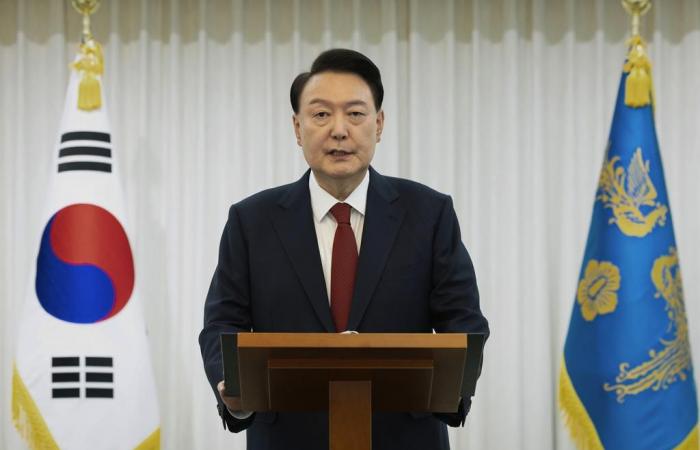South Korea –
Ousted President Yoon to be arrested by Monday
the head of the Bureau for the Investigation of Senior Corruption said that the shutdown order will be implemented “within the deadline”
Published today at 12:39 p.m.
An arrest warrant has been issued for South Korean President Yoon Suk Yeol following his failed attempt to impose martial law in early December.
KEYSTONE
Subscribe now and enjoy the audio playback feature.
BotTalk
Deposed South Korean President Yoon Suk Yeol will be arrested before the January 6 expiration of the arrest warrant issued against him, investigators said Wednesday, after his failed attempt to impose martial law in early December.
On Wednesday, supporters and detractors of Mr. Yoon gathered, insulting each other, near the home of the former head of state where he has been cloistered for weeks, ignoring three successive summons to be questioned about his coup by force.
The order will be implemented “within the deadline”, which is Monday at the latest, Oh Dong-woon, head of the Senior Corruption Investigation Office (CIO), told reporters.
The issuance of an arrest warrant against a sitting head of state is a first in South Korea, Mr. Yoon still officially being the titular president while waiting for the Constitutional Court to confirm or overturn his dismissal, voted on December 14 by the deputies.
Targeted for “rebellion”
The former star prosecutor stunned the country on December 3 by proclaiming martial law by surprise and sending the army to Parliament to try to muzzle him, before being forced to back down a few hours later under pressure of the National Assembly and thousands of demonstrators.
He is the target of several investigations, including one for “rebellion”, a crime theoretically punishable by death, and is prohibited from leaving the territory.
Investigators hope for “a smooth process without major disruption,” explained Mr. Oh, warning however that “mobilization of the police” was possible. He said anyone who opposed the arrest of the deposed leader could “be prosecuted” in court.
Mr. Yoon’s lawyers requested an injunction to quash the arrest warrant, with Mr. Yoon Kab-keun saying in a statement that it was “an illegal and invalid act.”
Outside his residence, dozens of people chanted, chanted and insulted the police, some attempting to break through a security cordon and prevent a police bus from parking near the entrance, believing that he was carrying members of the police responsible for arresting him.
A large police force was deployed, with the police shouting at protesters to stay away and the route to and from Mr. Yoon’s residence remained accessible.
South Korean authorities have previously failed to execute arrest warrants against parliamentarians – in 2000 and 2004 – due to the presence of members and supporters of their political party who prevented police from entering for seven years. days of validity of the mandate.
Searches obstructed three times
It is impossible to know exactly when the deposed ex-president will be arrested, his security service having already obstructed searches three times, even though on the orders of the courts.
On Wednesday, the majority of Mr. Yoon’s remaining aides, including his chief of staff and special advisers, all submitted their resignations to the acting president, who rejected them, calling instead for unity.
“This is the time for everyone to come together to ensure the stability of people’s livelihoods and national affairs,” Acting President Choi Sang-mok said.
They resigned in protest after Mr. Choi’s appointment the day before of two new judges to the Court, which had three vacant seats out of nine, to study the case.
This was a recurring demand from the opposition, a two-thirds majority (i.e. six votes) being necessary to confirm a dismissal.
A shocking decision
Mr. Choi has wielded presidential powers since Parliament impeached Prime Minister Han Duck-soo on Friday, who initially took over but was quickly ousted, accused of obstructing investigations into Mr. Yoon.
The latter had justified his shock decision of December 3 by his desire to protect South Korea from “North Korean communist forces” and to “eliminate elements hostile to the State”, accusing the majority opposition to Assembly to block the country.
A sufficient number of deputies had managed to meet urgently in a Parliament surrounded by special forces and to vote on a text demanding the lifting of martial law. Mr. Yoon had to comply a few hours later, obliged by the Constitution.
The Constitutional Court must rule by mid-June on the validity of the impeachment motion adopted against him, and thus decide whether to permanently dismiss him or return power to him.
“Latest news”
Want to stay on top of the news? “Tribune de Genève” offers you two meetings per day, directly in your email box. So you don’t miss anything that’s happening in your canton, in Switzerland or around the world.
Other newsletters
Log in
AFP
Did you find an error? Please report it to us.
0 comments






